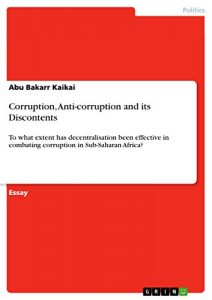Essay from the year 2015 in the subject Politics - International Politics - Region: Africa, grade: HD, Murdoch University (Sir Walter School of Public Policy and International Affairs), course: Development Studies, language: English, abstract: Given the conflicting ideas surrounding the impacts of decentralisation as predicted, this essay argues that while decentralisation may have contributed to improving good governance in certain countries around the world, the contrary holds for sub-Saharan countries. Thus, this essay explores the extent at which decentralisation has contributed to fighting corruption in the sub-Sahara.
Overwhelmed by bad governance, an eyesore of poverty and disease, the relics of prolong corruption and misrule have pushed developing countries in sub-Saharan Africa and their counterparts, the World Bank (WB) and International Monetary Fund (IMF) into political, administrative and economic reforms. Since the 1990s, decentralisation has been a key policy instrument advocated and favoured by governments, donor countries, civil society and international institutions to engender good governance. Many countries in Africa have speedily implemented political, administrative and fiscal decentralisation within the last three decades (Conyers 2007; Dickovick and Wunsch 2014). The primary or perhaps the profound motivation for the wave of decentralisation around the world, particularly in sub-Saharan, is based on the conceptual argument that it offers potential benefits. According to proponents, in a decentralised governance system where power and resources are devolved, services will increase alongside efficiency. Productive and economic growth will inhibit rent-seeking, encouraging downward accountability to promote civic participation in decision-making. This will eventually alleviate poverty and reduce corruption. It is expected that where these goals are achieved, the level of human development index will rise in sub-Saharan Africa.
In spite of the hypothetical rationale for adopting decentralised policy, there are several scholars and academics that are pessimistic and cynical about the concept. Tulchin et al. (2004) for instance, argues that due to the complex and fluid nature of decentralisation, it is highly unlikely to determine the actual outcome against expectation. To qualify this statement, Wunsch (2008) writes that evidence of decentralisation across Africa over the years has been frustrating. However, some evidence suggests that there have been improvement in service delivery in certain countries within this region. Although Conyers (2007:27) caution that is it hard to ascertain whether decentralisation contributed to the progress.
Overwhelmed by bad governance, an eyesore of poverty and disease, the relics of prolong corruption and misrule have pushed developing countries in sub-Saharan Africa and their counterparts, the World Bank (WB) and International Monetary Fund (IMF) into political, administrative and economic reforms. Since the 1990s, decentralisation has been a key policy instrument advocated and favoured by governments, donor countries, civil society and international institutions to engender good governance. Many countries in Africa have speedily implemented political, administrative and fiscal decentralisation within the last three decades (Conyers 2007; Dickovick and Wunsch 2014). The primary or perhaps the profound motivation for the wave of decentralisation around the world, particularly in sub-Saharan, is based on the conceptual argument that it offers potential benefits. According to proponents, in a decentralised governance system where power and resources are devolved, services will increase alongside efficiency. Productive and economic growth will inhibit rent-seeking, encouraging downward accountability to promote civic participation in decision-making. This will eventually alleviate poverty and reduce corruption. It is expected that where these goals are achieved, the level of human development index will rise in sub-Saharan Africa.
In spite of the hypothetical rationale for adopting decentralised policy, there are several scholars and academics that are pessimistic and cynical about the concept. Tulchin et al. (2004) for instance, argues that due to the complex and fluid nature of decentralisation, it is highly unlikely to determine the actual outcome against expectation. To qualify this statement, Wunsch (2008) writes that evidence of decentralisation across Africa over the years has been frustrating. However, some evidence suggests that there have been improvement in service delivery in certain countries within this region. Although Conyers (2007:27) caution that is it hard to ascertain whether decentralisation contributed to the progress.












